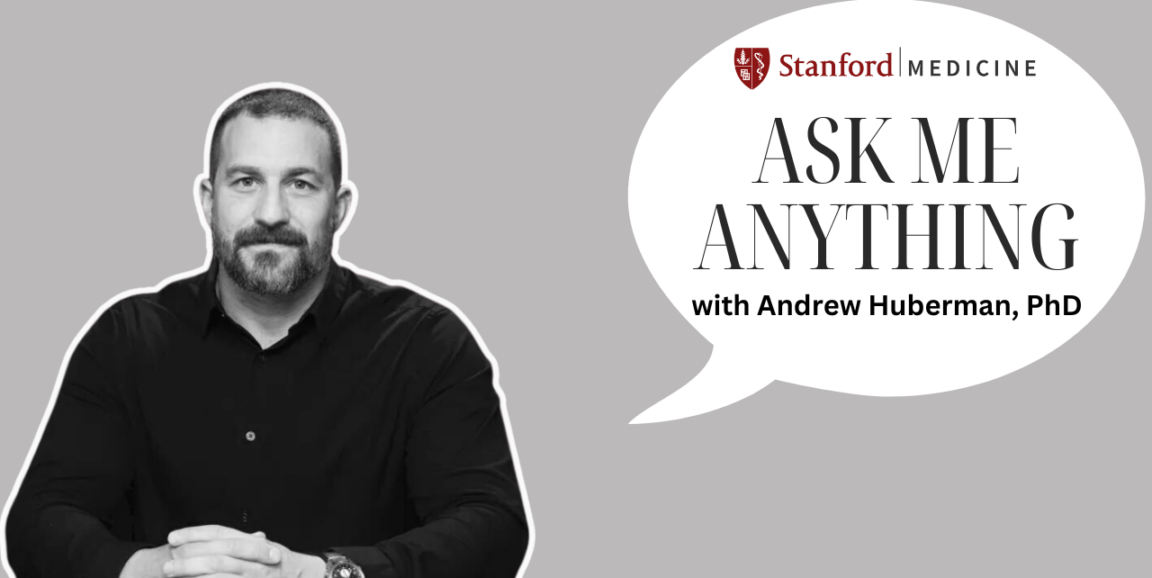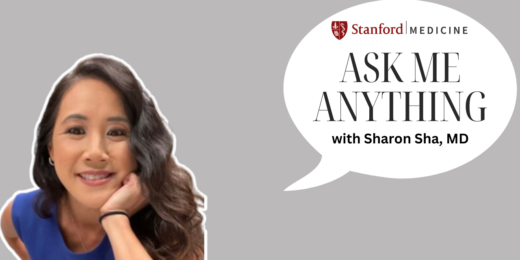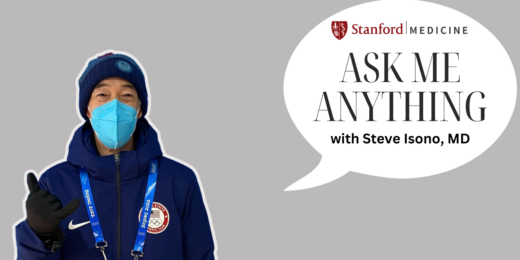Ever wonder what science says you should do to quell daily anxiety? What about how to fall back asleep when you wake in the middle of the night?
In our latest Ask Me Anything on Stanford Medicine's Instagram account, neuroscientist and podcaster Andrew Huberman, PhD, untangled those and other complicated questions about human behavior, and shared the latest on what's brewing in his lab.
During a live conversation with our senior manager of media relations, Lisa Kim, Huberman explored, among other things, how to get a good night's sleep, the importance of exercise and quality nutrition, building resilience against stress, and why we need sunlight in our day-to-day lives.
Parts of the conversation are represented in the following Q&A, which has been condensed and edited for clarity.
We got a lot of questions about sunlight and what it's supposed to do for the body. What does exposure to sunlight early in the morning do?
Light sets your circadian rhythm for wakefulness, and it helps you feel better throughout the day. It's what we call a slow integration system. Going outside first thing in the morning and looking into sunlight for five to 30 minutes, depending on how bright it is outside, taps into hormone systems and neurotransmitter systems in the brain and body that kick in over the course of minutes to hours.
That ends up feeling like a slow increase in your overall energy and mood. Every 24 hours, we release a hormone called cortisol. A lot of people think cortisol is bad, but it's important for your immune system and for energy, provided it's not too high or too frequent. A cortisol release needs to arrive early in the day to get the most out of it.
But work from my Stanford Medicine colleague David Spiegel and others has shown that if you don't get sunlight early in the day, that cortisol release starts shifting later, which creates issues with insomnia and anxiety and even some low-level depression later in the day. Now, that does not mean that if you miss getting sunlight one day that you're going to get depressed. It's a slow, integrated mechanism.
Can taking melatonin supplements be helpful as a sleep aid?
It's effective in that it can shift your circadian clock. But I am a strong believer in avoiding taking exogenous melatonin. First of all, it's been well documented that many of the supplements that contain melatonin have far too much -- 3 to 6 milligrams is a massive dose. Typically, the body makes very little melatonin.
The other issue is that not all supplements contain what they say they contain. This is especially true for melatonin -- even supposedly reliable brands can contain 15% to 155% of the dosage that's listed on the bottle.
There are healthier alternatives, but I want to really emphasize -- and I'll probably go into my grave saying this -- use behavioral tools first. Get morning sunlight, avoid too much light late at night, then look to quality of nutrition and eating habits. Being too hungry or eating too close to bedtime can both inhibit sleep. Get quality exercise, and don't drink caffeine after 2 or 3 o'clock in the afternoon. Before you start thinking about supplements or prescription drugs for sleep, it's really important to have all the other things right. And the nice thing about all those is that they are all zero cost.
How can I help my anxiety?
For day-to-day anxiety as opposed to an anxiety disorder -- which should be taken seriously and addressed with the help of a medical professional -- there are real-time tools to push back on anxiety and stress and raise our threshold for stress. We are collaborating with our associate chair of psychiatry, David Spiegel, on a study that harnesses a natural pattern of breathing that we do in sleep. It's called the physiological sigh, which was discovered by physiologists in the 1930s and is very effective at reducing anxiety practices while we're awake.
During sleep, carbon dioxide in your bloodstream sometimes gets too high and your levels of oxygen will get too low, so you're actually becoming asphyxiated but don't realize it because you're asleep. Under those conditions, your body will do a double inhale through your nose and then a long exhale through your mouth.
To use this technique to address anxiety, take a really deep inhale through the nose and, when you feel your lungs are full, make every effort to sneak in a little bit more air. Then slowly release all the air through the mouth.
What does the physiological sigh do to the brain and body?
When you are stressed, you tend to under-breathe, which can elevate the level of carbon dioxide in your bloodstream. This makes the little sacs, or alveoli, that increase the surface of your lungs collapse. They don't easily re-inflate, which is why we sneak that air in at the end. Then do a long exhale to get rid of all the carbon dioxide that's built up in your system and is causing your body stress.
When someone is trying to help you de-stress and they tell you to take a deep breath, what they really should tell you is take a long exhale. This type of sigh can also be great if you are having a hard time falling asleep or back to sleep. Try doing a few physiological sighs, really extending that exhale, and you'll notice your core, your diaphragm region, will start to relax. This feeds back to the nervous system, then to the brain, which then feeds back to the body to relax it.
What about being mentally strong? How do you build mental resilience?
We hear about grit, resilience and mental toughness. How do you cope better? The best way to cope is to not get stressed in the first place. But the next best thing is to get comfortable with certain levels of stress -- with having a spike of adrenaline in your body.
Many people are not familiar with the feeling of their heart racing, which can happen in a social setting: Maybe you're preparing for a presentation at work or for a tough conversation, or you're afraid of going to the doctor. These situations can increase adrenaline, and people start to get nervous. So, here's the key: David Spiegel says there's something very powerful about self-inducing a state. The stress isn't created from the outside; you're creating that sense of stress deliberately.
There are a couple ways to do this. You need to increase the adrenaline but you need to do it in a healthy way. What can you do? You could take a cold shower and learn to stay calm or calm yourself with the inevitable increase in adrenaline. Remember, adrenaline is non-negotiable. What matters is how you navigate the choppy waters of adrenaline in your system. You can train that by taking a cold shower for a minute to three minutes, and you will get better at tolerating stress. That shot of adrenaline will become a familiar place.
Another way is called cyclic hyperventilation, or self-directing adrenaline increases by deliberately hyperventilating. I would suggest that people who have anxiety not do this when they're in an anxious state and to ease into it over time, because it will very quickly liberate adrenaline in your body.
It's essentially breathing rapidly in through the nose and out through the mouth repeatedly, then exhaling all your air, waiting 10 or 15 second and trying again. But be very careful: If you're somebody who is prone to panic attacks, you might throw yourself into one.
But if you're somebody who suffers from moderate levels of anxiety and you want to build resilience, try five breaths every few days, then maybe 10 breaths for few rounds. What you'll notice over time is that your threshold for adrenaline starts to go up.
Can you talk about the power of cognition in health?
I'm always a proponent of changing behaviors first. But wouldn't it be beautiful if there was something that we could do just with our mind, with our thinking, to enhance our health and well-being? Well, that tool exists. It's a script, of sorts, that my lab has been working on called non-sleep deep rest, or NSDR. It can help us rewire our thinking and our ability to heal and deal with psychological and/or physical problems better.
NSDR involves bringing your nervous system into a state of deep relaxation, and it has been shown to have a handful of major positive effects. It can lead to replenished levels of dopamine, which is a molecule responsible for motivation, among other things. There is also early data showing improvements in cognitive function for people who do this regularly. It can also help replace some of the sleep that you may have missed. If you're not getting enough sleep, you can do this when you wake up in the morning.
For more information on Andrew Huberman's research, visit the Huberman Lab website. For more Ask Me Anything content, visit related Scope stories.
Photo courtesy of Andrew Huberman






